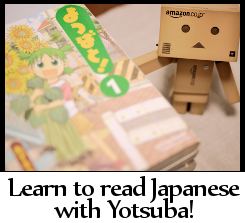How to learn Japanese
I want to lay out what is required to learn Japanese in the briefest way possible. Use this page if you feel lost and don't know how to approach learning Japanese. Adjust things to suit your needs, but above all – keep studying.
1. Study every day.
Momentum is the key to developing any skill. Studying needs to be a habit. It needs to have a natural place in your life, and in order for that to happen you have to study every day. The more you study per day, the faster you'll improve. Figure out how much time you can use in each day for Japanese and then dedicate yourself to using it.
2. Learn the kana.
Hiragana are more useful than Katakana, so learn those first. You may want to put off learning the Katakana until a couple weeks after you've “mastered” the Hiragana.
3. Learn the kanji.
Either use Heisig and learn to recognize all of the kanji in one go or prepare a flashcard method for learning kanji as you encounter them. Kanji are a big hurdle in Japanese, so the sooner you begin working on them the better.
4. Learn the basic particles.
You need a grasp of the particles and Japanese sentence structure to understand even the most basic sentences. Doing the early sections of Tae Kim's Grammar Guide is a good way to get a foundation of grammar knowledge.
5. Begin reading Japanese.
You'll be slow, but you can do it. The act of reading will show you what you don't know. Look up the things you don't know and add them to your flash cards (Anki). Read something that interests you or that you already have background knowledge in (such as a story you've read before in English). The Yotsubato! Reading Companion was made to help with this.
6. Continue reading and building knowledge.
Reading is the easiest way to discover grammar and vocabulary that you don't know. Continue to read every day to find new things to learn.
7. Begin listening to Japanese.
Music, TV shows, news programs, NicoNico live streams – whatever. Listen to Japanese people speaking Japanese and try to understand them. Look up words you hear. If talking to someone, ask them to write down words for you too look up later.
8. Begin writing Japanese.
If you're taking classes, your teacher can help you with this. Have them check your writing and correct it. If you are not in classes, Lang-8 is your best bet. Start small and refer to grammar guides often.
9. Begin speaking Japanese.
Once you've gotten a grasp of forming sentences by writing you can begin to work on speaking. Speaking requires immediate recall of tons of words and really tests your understanding of grammar. Improving speaking ability is the greatest feature of taking a Japanese class.

